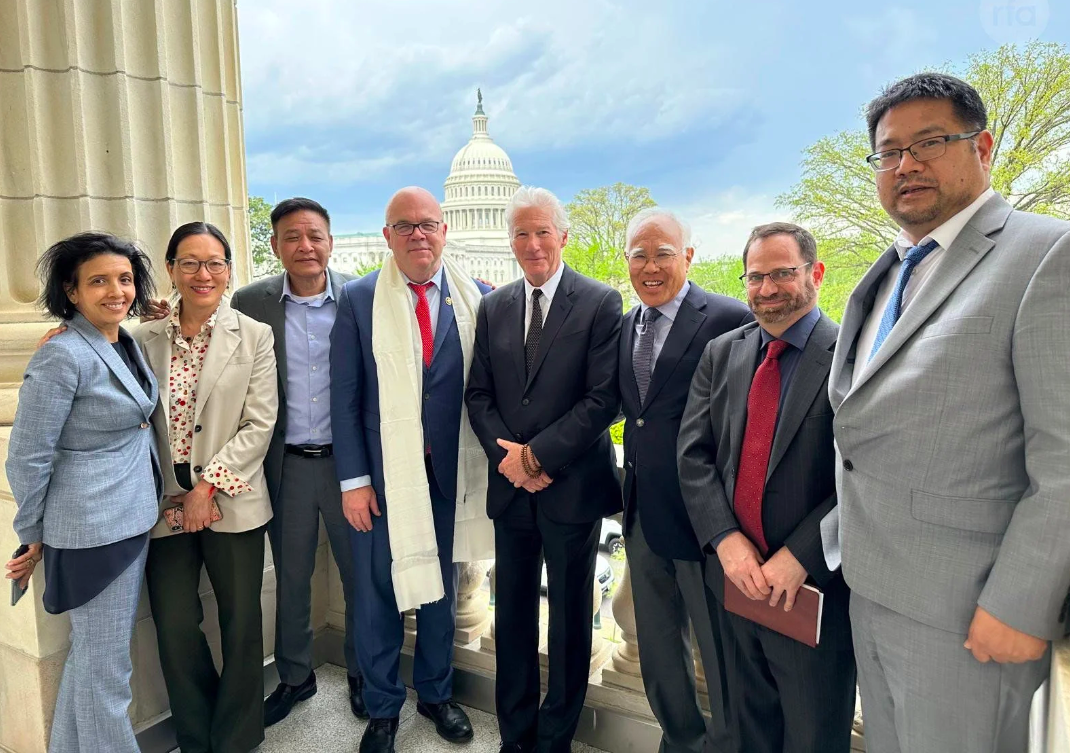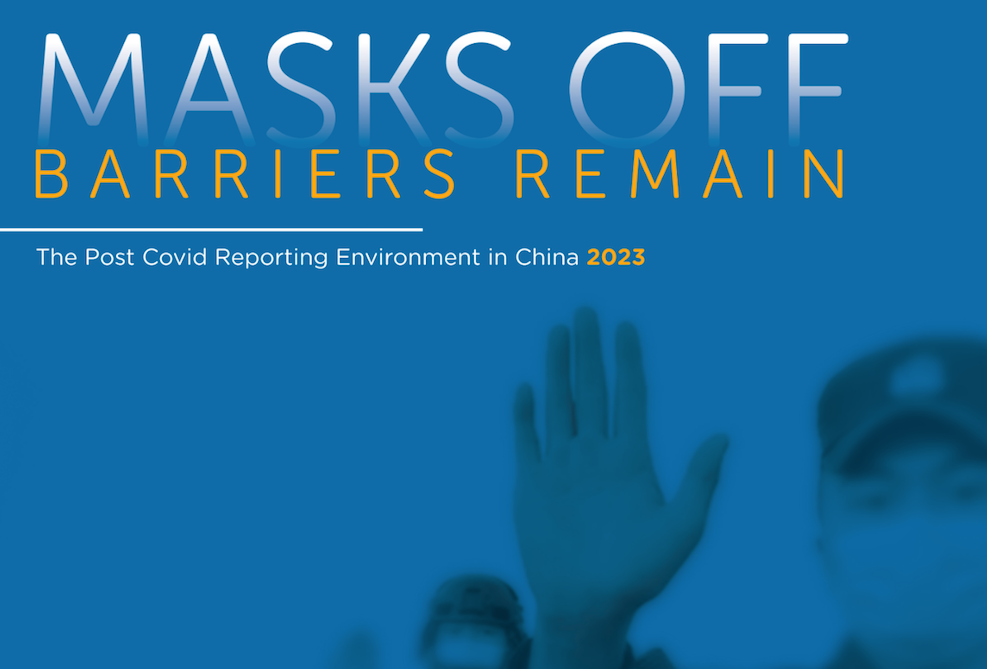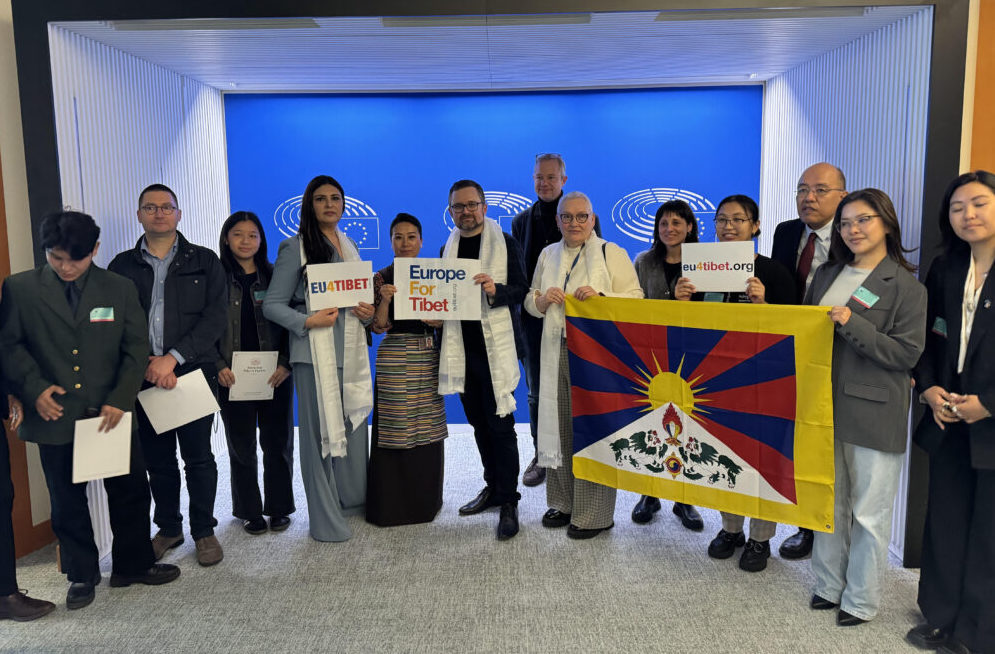Bodh Gaya, January 13 – The three-day preliminary teachings of the Kalachakra puja began yesterday in the afternoon at the Kalachakra Maidan in Bodh Gaya. Over a hundred thousand devotees from all over the world attended the teachings by His Holiness the Dalai Lama, which continued this afternoon. His Holiness gave a religious discourse on the 37 Practices of Bodhisattva and Lamp of the Path to Enlightenment.
The teachings began with a recitation of Buddhist Sutra in Pali, Sanskrit, Korean, Japanese, Vietnamese and Chinese by the representatives of the monks and nuns of various Buddhist temples in Bodh Gaya. A significant number of local people and about two thousand foreigners also attended the teachings of His Holiness the Dalai Lama. A simultaneous translation of the teachings into Hindi and English has been officially made available to the devotees. There are also translations available into few other languages arranged by different groups from abroad.
During the teachings this afternoon, His Holiness the Dalai Lama gave Gye-nyey Donpa (religious vows for the lay people) for those lay devotees, who wish to take this vow. The devotees, who take this vow, must avoid the following five demerits or any of them, which he or she can decide: Sok-choye, Majenpay Lenpa, Lok-yem, Tzun, and Chang Ara.
His Holiness the Dalai Lama took a very brief moment to reply to a few questions from the media persons just before returning to the Maitreya Project yesterday after the teachings was over at the Kalachakra Maidan (see the transcript below). The Office of His Holiness the Dalai Lama and DIIR will be organising a Press Opportunity with His Holiness the Dalai Lama on Thursday, 16 January 2003 at 1030 hrs at the Kalachakra temple here.
The preliminary teachings by His Holiness will continue tomorrow in the afternoon.
The DIIR’s public talk and video show kicked off last evening. Kalon Thupten Lungrig, Kalon for Religion & Culture and Education, spoke on the life and mission of His Holiness the Dalai Lama in this series of public talk in Bodh Gaya. The public talk and video show will continue every evening for the next six days.
The transcript of His Holiness the Dalai Lama’s reply to the questions from the media persons at the Kalachakra temple just before leaving for the Maitreya Project on January 12, 2003 at 1630 hrs.
(First question on the Kalachakra, audio not available.)
What do you think about the terrorism and the danger of war today?
The early part of the 20th century compared to the later part of the 20th century and present 21st century was marred by violence. In the 21st century, I think, in spite of some unhealthy developments here and there, the world is becoming safer. This is my feeling. And also, I think, the desire for peace every where is much stronger in the 21st century. In the past, in the name of patriotism and ideology, millions of people were ready to sacrifice their own lives, but that concept is no longer there. Terrorism, of course, is the worst kind of violence. It is very bad. I always believe that there are several levels of counter measures. At one level, I think, there are the immediate sorts of measures, which the leaders take, such as sending commandos. These are temporary immediate sort of measures. In the long run, it is very essential that individuals must create within ourselves a more peaceful and compassionate inner world. This certainly can create a peaceful and friendly atmosphere within our own home or family, and through this way in the society. Then, there are educational institutions. I think, besides knowledge or education, we must make more efforts to cultivate compassion, and through compassion, the sense of dialogue. I think this must increase. This is my feeling. Sometimes, when we see conflict, the immediate sort of response that comes to our mind is to solve this problem by force, not through dialogue. But on the other hand, at the human level, I think, everybody, wherever he or she lives, has some potential to create a more peaceful and compassionate world. This is, in the long run, a more effective approach.
You have said China has liberalized. How do you substantiate this?
China is changing as the world is changing. Firstly, at the global level, communist totalitarian regimes are almost gone, except in North Korea, China and Vietnam, and in some way Cuba. This change has been brought about by popular peaceful movements, not by the presence of nuclear weapons. Likewise, today’s China, compared with 20 years ago, has changed much. Although, in China, there is still no rule of law, and no freedom of speech and press. All the media in China is controlled by the government, which is, of course, unfortunate. But compared to the past years, people can criticize their leaders in teashops. This sort of thing was not possible 30 years ago. So, these are the signs of change. Now this change will continue. The problem of Tibet is not caused by any civil war or conflict due to religion, ideology or some other reasons, but by the presence of Chinese in Tibet. Therefore, the change in China will have a direct impact on Tibet.
(on the question of autonomy and freedom of Tibet)
I always make it clear that I am not seeking independence for Tibet irrespective of past history. Under the present circumstances, the world is becoming more interdependent. When I was in Taiwan, I told some of the Taiwanese politicians, who seek independence for Taiwan, that as far as Tibet is concerned, I am not seeking independence. In the present circumstances, I think, Taiwan should have a very unique close relation with Mainland China in the field of economy and defence. So, now in the modern world, complete separation or sovereignty does not have much relevance.
Contact: Sonam N. Dagpo, Additional Secretary
Masood Butt, Press Coordinator
Gendun Choephel, Assistant Press Coordinator
Department of Information and International
Relations
Central Tibetan Administration
Dharamshala, H.P., India
Camped at: Mahayana Guest House, Bodh Gaya
Tel: +91-631-2200675, 2200756
Fax: +91-631-2200676
E-mail: buttm70@yahoo.com
Website: www.tibet.net









